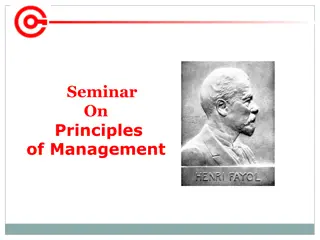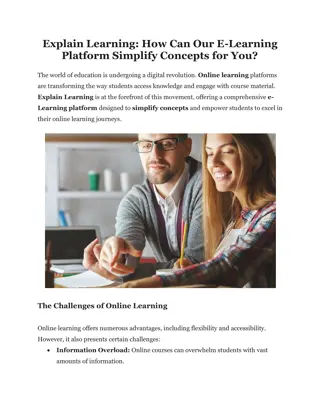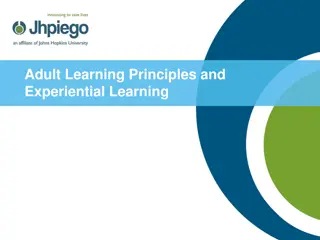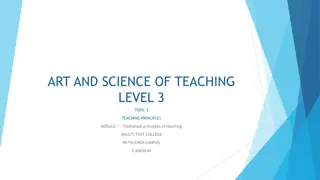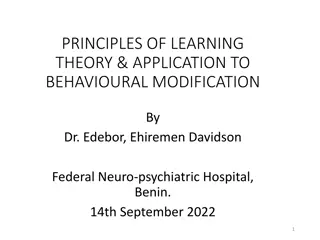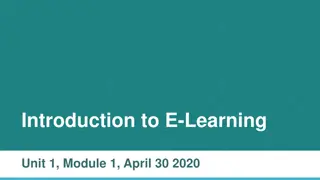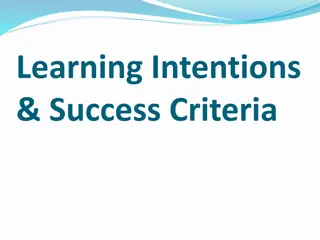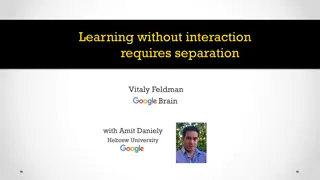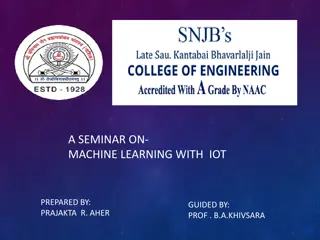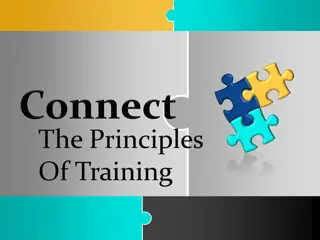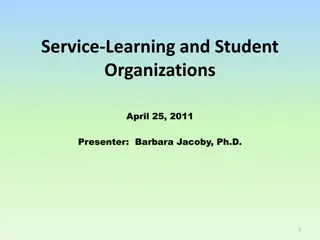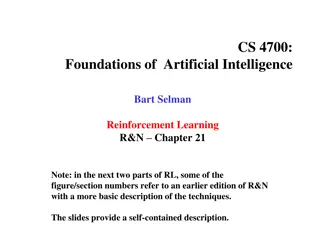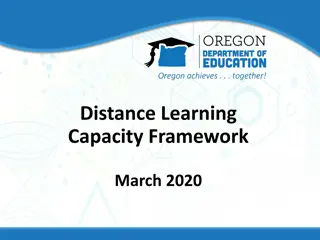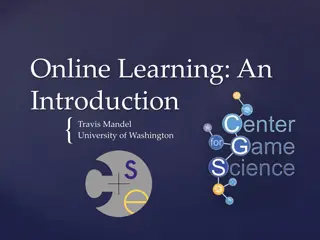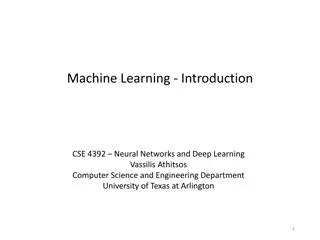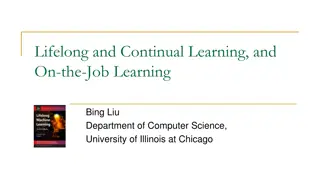Principles of the Ghana Civil Service Code of Conduct
The Code of Conduct for the Ghana Civil Service, outlined by Elizabeth Obeng-Yeboah, emphasizes principles such as abiding by the constitution and laws with dignity, integrity, and professionalism. It sets standards for conduct, avoiding conflicts of interest, maintaining political neutrality, and u
1 views • 34 slides
Academic Freedom and Shared Governance in Higher Education
Academic Freedom and Shared Governance are foundational principles advocated by the American Association of University Professors (AAUP) to ensure educators have the freedom to explore, research, teach, and discuss without censorship. These principles empower educators to enhance student learning an
0 views • 9 slides
Essential Principles of Management Discussed in Seminar
Explore the foundational principles of management discussed in a seminar on principles of management. Delve into topics such as division of work, authority, discipline, unity of command, and unity of direction as outlined by Henri Fayol. Gain insights into the importance of these principles for effe
0 views • 22 slides
Explain Learning How Can Our E-Learning Platform Simplify Concepts for You
Explain Learning is at the forefront of this movement, offering a comprehensive e-learning platform designed to simplify concepts and empower students to excel in their online learning journeys. Know more \/\/explainlearning.com\/blog\/explain-learning-e-learning-platform-simplifies-concepts\/
1 views • 4 slides
Adult Learning Principles and Experiential Learning Overview
Understand the key principles of adult learning and the importance of experiential learning. Explore how adults learn best, their characteristics, and the benefits of experiential learning approaches. Gain insights into creating effective learning environments for adult learners.
0 views • 6 slides
International Law of War: Nuremberg Principles and Accountability
The Nuremberg Principles, derived from the trials of Nazi officials for war crimes, establish accountability in international law. These principles hold individuals responsible for committing acts considered crimes under international law, regardless of their position or orders received. The assumpt
2 views • 22 slides
Traditional Principles of Teaching and Learning: A Comprehensive Overview
Explore the fundamental concepts and principles in education, encompassing known-to-unknown, simple-to-complex, and concrete-to-abstract ideas. Delve into traditional teaching principles like continuous development, self-activity, socialization, authority and freedom, and perception. Uncover the hol
0 views • 8 slides
Promoting Ethical Principles in Social Science Research
Explore the challenges and strategies for translating and applying ethical principles, especially in emergency contexts. Learn key questions in social science research and how to ensure information contributes to community actions. Understand the importance of considering ethical principles in all w
0 views • 21 slides
Understanding Principles of Learning Theory and Behavioral Modification
Explore the principles of learning theory and its application in behavioral modification, highlighting concepts such as classical and operant conditioning. Learning, defined as a permanent change in behavior due to experience, is distinguished from performance. Discover how learning potential differ
2 views • 48 slides
Exploring E-Learning: Benefits and Strategies for Higher Education in Iraq
Dive into the world of e-learning with this comprehensive module focusing on the need for online education in higher education institutions in Iraq. Learn about the basic principles, best practices, and instructional strategies for successful online instruction. Discover the role of technology in te
2 views • 22 slides
Understanding Learning Intentions and Success Criteria
Learning intentions and success criteria play a crucial role in enhancing student focus, motivation, and responsibility for their learning. Research indicates that students benefit greatly from having clear learning objectives and criteria for success. Effective learning intentions should identify w
1 views • 24 slides
Online Seminar: Theories of Learning in Initial Teacher Education
This collection of online seminar slides introduces pre-service teachers to major theories of learning, including the Science of Learning through cognitive neuroscience. The presentation aims to help educators consider implications for teaching, recognize theories in action, and pose critical questi
1 views • 11 slides
Experiential Learning Portfolio Program at Barry University
Experiential Learning Portfolio Program at Barry University's School of Professional and Career Education (PACE) offers a unique opportunity to earn college credit for learning gained from work and community service experiences. Through this program, students can showcase their experiential learning
0 views • 16 slides
Study Guide for Principles of Management Course at Africa Research University (ARU)
Welcome to Africa Research University (ARU)! This study guide is designed to help you navigate through the Principles of Management course (Course Code: PRM4) at ARU. It provides an introduction to the course content, emphasizing the importance of developing management skills to effectively lead and
1 views • 40 slides
Exploration of Learning and Privacy Concepts in Machine Learning
A comprehensive discussion on various topics such as Local Differential Privacy (LDP), Statistical Query Model, PAC learning, Margin Complexity, and Known Results in the context of machine learning. It covers concepts like separation, non-interactive learning, error bounds, and the efficiency of lea
0 views • 14 slides
Key Principles of Insurance Explained with Visuals
Understanding the principles of insurance is crucial for both insurance seekers and companies. The principles include Utmost Good Faith, Insurable Interest, Indemnity, Contribution, and Subrogation. These principles ensure transparency, fairness, and protection for policyholders. Visual representati
0 views • 6 slides
Seminar on Machine Learning with IoT Explained
Explore the intersection of Machine Learning and Internet of Things (IoT) in this informative seminar. Discover the principles, advantages, and applications of Machine Learning algorithms in the context of IoT technology. Learn about the evolution of Machine Learning, the concept of Internet of Thin
0 views • 21 slides
Methods of Teaching in Physical Education - Overview and Principles
Teaching methods are essential for helping students achieve learning outcomes by mastering course content and learning to apply it in different contexts. Principles such as creating an active learning environment, establishing rapport, providing feedback, promoting inclusivity, managing time, motiva
0 views • 11 slides
Innovative Learning Management System - LAMS at Belgrade Metropolitan University
Belgrade Metropolitan University (BMU) utilizes the Learning Activity Management System (LAMS) to enhance the learning process by integrating learning objects with various activities. This system allows for complex learning processes, mixing learning objects with LAMS activities effectively. The pro
4 views • 16 slides
Principles of Training: Overload, Specificity, and Progression
Principles of training encompass overload, specificity, and progression. Overload requires doing more than usual, specificity involves tailored activities, and progression ensures gradual advancement. These principles are vital for improving fitness levels safely and effectively, emphasizing the nee
8 views • 17 slides
Exploring Service-Learning and Student Success in Higher Education
This presentation by Dr. Barbara Jacoby delves into the intersection of service-learning and student organizations, emphasizing the public purpose of higher education, student engagement in learning, and the importance of learning outcomes and assessment. It covers fundamental principles, designing
2 views • 23 slides
Unlocking the Power of Online Learning with Jenifer Grady
Explore the transformative nature of learning through online platforms with insights from Jenifer Grady. Understand the essence of learning, reasons behind learning, accessibility, and the concept of online learning. Discover how learning can be achieved anywhere, anytime, and delve into the world o
0 views • 26 slides
Enhancing Learning Through Active Strategies and Learning Styles
Implement active learning strategies to engage students, deliver and review content, and foster collaboration. Explore Kolb's Learning Styles to accommodate diverse learner preferences and maximize learning outcomes. Integrating learning activities based on individual styles can create a more effect
0 views • 22 slides
Introduction to Reinforcement Learning in Artificial Intelligence
Reinforcement learning offers a different approach to problem-solving by learning the right moves in various states rather than through exhaustive searching. This concept, dating back to the 1960s, involves mimicking successful behaviors observed in agents, humans, or programs. The basic implementat
0 views • 15 slides
Distance Learning Capacity Framework & Guiding Principles for Online Education
The Distance Learning Capacity Framework and Guiding Principles for online education emphasize safety, wellness, equity, and innovation in the educational process. It stresses the importance of connectivity, technology, educator efficacy, and student proficiency in online learning. These principles
0 views • 11 slides
Effective Partnership and Mutual Accountability in Nutrition Clusters
The content discusses the minimum commitments needed for participation in Nutrition Clusters, explains the Principles of Partnership, and explores how these principles can enhance coordination and accountability to affected populations. It emphasizes partner commitments, such as leadership, mainstre
0 views • 7 slides
Overview of Fundamental Principles of Space Law and Outer Space Treaties
The content discusses the fundamental principles of space law highlighted at the United Nations Space Law Conference 2020, focusing on key treaties such as the Outer Space Treaty of 1967 and associated rights, duties, and obligations of states in space exploration and use, including non-appropriatio
0 views • 16 slides
Overview of Directive Principles of State Policy in Indian Constitution
Directive Principles of State Policy (DPSP) in the Indian Constitution encompass social, economic, and political programs aimed at realizing ideals of justice, liberty, equality, and fraternity. They are non-justiciable but guide the state in legislative matters. Classified into Socialistic, Gandhia
0 views • 24 slides
Understanding Online Learning in Machine Learning
Explore the world of online learning in machine learning through topics like supervised learning, unsupervised learning, and more. Dive into concepts such as active learning, reinforcement learning, and the challenges of changing data distributions over time.
0 views • 49 slides
Impact of Online Learning on Parental Engagement in CLD Context
The global pandemic in 2020 led to the closure of schools, shifting learning to online platforms. This study explores how online learning has affected parental engagement in Culturally and Linguistically Diverse (CLD) contexts. Family Learning, distinct from homeschooling, plays a crucial role in en
0 views • 11 slides
Understanding FAIR Principles in Biomedical Research
The FAIR principles - Findable, Accessible, Interoperable, and Reusable - provide a framework for ensuring scientific data in biomedical research is managed and shared effectively. This informative session delves into the theory and practice of FAIR principles, emphasizing the importance of data qua
0 views • 28 slides
The FAIR Principles for Data Management and Stewardship
Embrace the FAIR principles - Findable, Accessible, Interoperable, Re-usable - for effective scientific data management and stewardship. Learn how annotations enhance data FAIRness and the key attributes of each principle. Dive into the high-level guiding principles that ensure data is globally uniq
0 views • 25 slides
Understanding the Guiding Principles for Evaluators
This content provides insights into the Guiding Principles for Evaluators, including their history, assumptions, and key principles such as Systematic Inquiry and Competence. The workshop aims to increase knowledge about ethical evaluation practices and stimulate discussions within the evaluation co
0 views • 22 slides
Guiding Principles for GETSI/INTEGRATE Webinar – Materials Development and Goals
The webinar presented by David Steer from the University of Akron focuses on guiding principles for material development in the context of GETSI/INTEGRATE modules. It outlines goals for the session, including discussing components of the guiding principles, examples of meeting those principles, and
0 views • 13 slides
Understanding Henri Fayol's 14 Principles of Management
Henri Fayol, the Father of Modern Management, introduced 14 Principles of Management in 1916, outlining essential guidelines for effective management. These principles cover areas such as division of work, authority and responsibility, discipline, unity of command, and unity of direction. By followi
0 views • 19 slides
Principles of Management: Understanding Henri Fayol's 14 Key Principles
Explore the foundational principles of management through the lens of Henri Fayol's 14 key principles, which offer valuable insights into managerial decision-making and organizational interactions. Delve into the history of Henri Fayol, his contributions to management theory, the concept of authorit
0 views • 14 slides
Understanding Machine Learning: Types and Examples
Machine learning, as defined by Tom M. Mitchell, involves computers learning and improving from experience with respect to specific tasks and performance measures. There are various types of machine learning, including supervised learning, unsupervised learning, and reinforcement learning. Supervise
0 views • 40 slides
Legal Principles of Insurance
The legal principles of insurance include indemnity, insurable interest, subrogation, and utmost good faith. These principles ensure fair compensation, financial risk protection, and honesty in insurance contracts. Understanding these principles is crucial for both insurers and policyholders to navi
0 views • 18 slides
Lifelong and Continual Learning in Machine Learning
Classic machine learning has limitations such as isolated single-task learning and closed-world assumptions. Lifelong machine learning aims to overcome these limitations by enabling models to continuously learn and adapt to new data. This is crucial for dynamic environments like chatbots and self-dr
0 views • 32 slides
Enhancing Learning Through Co-Created Interactive Courseware and Learning Analytics
Explore the innovative concept of co-creation in interactive courseware and learning analytics to improve student learning outcomes. Discover how students collaborate in a social learning environment, track their progress, and engage in dialogic and constructive pedagogical strategies. Harness the p
0 views • 19 slides


